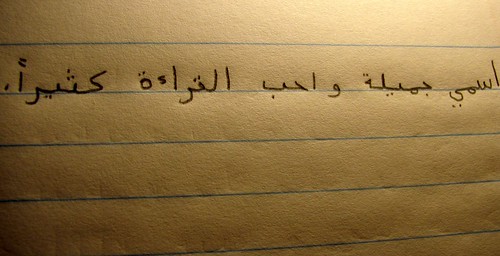Occasionally this summer I’ve posted some observations inspired by my experience in an intensive Arabic language program (here and here, to be specific.) Well, I am happy to report that after a final exam (complete with a somewhat nerve-wracking oral exam wherein my professor asked questions about what I wanted to do with my future, and, lacking the vocabulary to say “I want to be a diva superstar” I had to settle for saying some stuff about teaching English as a second language) I finished the program on Friday. (Got a pretty good grade, too, if I do say so myself.)
So now that I am at least basically conversant and literate in four languages, I am taking a little time off from working toward being a diva superstar to do some truly important things, like laundry. Arabic has been, by far, the most difficult language I have studied, most likely because the other three are Latin-based and Arabic… isn’t. (Even so, it does share similarities with other languages I know. Want a quick Arabic lesson? Okay. Do you want to learn how to say “t-shirt” in Arabic? Ready? T-shirt.) It took me a long time to figure out its internal logic and rhythm, and I’m still not entirely sure I did find it. It’s a rich language, with so many words that sound so similar to each other that it must have endless opportunities for wordplay. At least for people who are fluent, which I most assuredly am not.
My major reason for taking the Arabic class was to gain a foundation in the language so that I could converse with the Arabic-speaking members of my family and (I hoped) build from there. I visited some relatives a little over a week ago and learned that this is going to be harder than I thought — the language I learned in class is formal Arabic, which is typically used for things like writing and the news. The Arabic that people speak not only varies from country to country, but does a lot of things differently than what I learned in class (for example, formal Arabic and colloquial Arabic negate the past tense in different ways). In short, I listened to my relatives talk and realized that I was going to have to do a lot of work to get to a level where I was truly able to converse with them. I knew this going in, because it’s not like getting a year’s worth of instruction in any language prepares a person for fluent, natural conversation, and I also know that school language is different from street language, but I guess I didn’t realize how different the two truly were. It’s a good thing I like a challenge.
Anyway, there you have it. I hope to continue on with Arabic in the future because, no matter how brain-achingly difficult it is at times, it really is a fascinating language. And even though I never want to try to cram a year’s worth of study into two and a half months ever again, the experience was a good one.
And just as a (probably lame) ending to this little series, here is a note in Arabic from me to you:

That says “My name is Jamelah and I like reading a lot.” Genius, I know.



2 Responses
Well, now…After you get
Well, now…
After you get really good at talking to members of your Arabic family, you could branch out to translating for Words Without Borders. Or be an ambassador to the Middle East. I’m just saying, if you wanted to. Because the solution for peace isn’t military, it’s political, sociological, and literary communication.
It’s really too badthat your
It’s really too bad
that your excellent updates from the front don’t garner more response. Sure, they’re not about Kerouac or the latest nude poetry reading or whoever the darling is of the moment, but what they are about is something real and human. Perhaps that defies anyone to come in and counterpoint as an expert. Ya Jamelah, more al-writing, please.